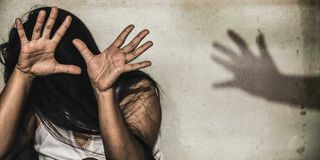Art, activism unite to confront violence against women and girls

Art, activism unite to confront violence against women and girls.
What you need to know:
- Ntozake Shange’s 50-year-old play, previously staged in Kenya in 2013 to rave reviews, is set to return on November 25 as the world observes 16 Days of Activism against GBV.
- The show, which will be staged in Nairobi, Kisumu and Mombasa, is a collaboration between the theatre company ACT: New Nordic Voices, the Danish Embassy and the EU in Kenya.
- It’s part of a campaign dubbed “Silenced No More: Confronting Violence against Women and Girls”.
In the movie adaptation of award-winning play For Colored Girls Who Have Considered Suicide When the Rainbow is Enuf, a chilling scene portrays a man, consumed by a drunken rage, dangling his two children out of a window, dropping them to their tragic deaths while the screaming mother fights him, desperately trying to save them.
This heart-wrenching moment shook me to the core and deepened my empathy for survivors and victims of domestic violence. It laid bare the rawness of their experiences in ways little else could.
Ntozake Shange’s 50-year-old play, previously staged in Kenya in 2013 to rave reviews, is set to return on November 25 as the world observes 16 Days of Activism against Gender-Based Violence (GBV).
The show, which will be staged in Nairobi, Kisumu and Mombasa, is a collaboration between the theatre company ACT: New Nordic Voices, the Danish Embassy and the European Union in Kenya.
It’s part of a campaign dubbed “Silenced No More: Confronting Violence against Women and Girls”.
One in three women globally will face GBV in their lifetime—a silent and stigmatised pandemic, and the campaign seeks to promote discussion and awareness of this issue.
If a nation’s soul resides in its literature and arts, as suggested by Uganda’s former President Milton Obote, then a play is certainly an ideal tool to confront pandemic-level issues like GBV.
Through powerful storytelling, the play articulates women’s personal stories of oppression and suffering in a sexist and racist society, providing the audience with a visceral experience of violence. But can a play really make a difference?
In a recent panel discussion where I interviewed Michael Omoke, the artistic director at ACT: New Nordic Voices, which is producing the show, he emphasised the power of theatre in engaging people, provoking thought, and stimulating intellectual discussions.
Referring to theatre as a medium for cultural diplomacy, he highlighted its historical use as a universal tool during oppressive regimes and stressed its potential to address issues such as GBV.
For Colored Girls blends poetry, music, and dance in the performance to tackle heavy topics like rape, domestic violence, post-traumatic stress disorder, and abortion, making it a “conversation starter and a powerhouse for addressing the global theme of gender-based violence”.
Art, with its timeless and universal language, has the power to be a catalyst for change, fostering empathy, understanding, and dialogue on pressing social issues such as GBV.
Works like For Colored Girls speak to the shared humanity and experiences of individuals, making individual suffering universal.
While theatre is not a magic pill that can make GBV go away, it can start difficult conversations by treading lightly on heavy topics.
The writer comments on gender and social topics (@FaithOneya; [email protected]).





